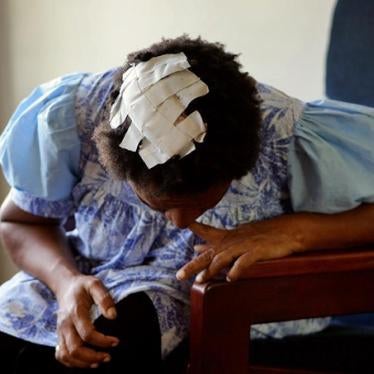(Sydney) – Papua New Guinea remains one of the most dangerous places in the world to be a woman, highlighting the government’s failure to enforce legal protections against gender based violence and discrimination, Human Rights Watch said today in its World Report 2015. During 2014, gender inequality, violence, corruption, and excessive use of force by police were among pressing human rights concerns.
In the 656-page world report, its 25th edition, Human Rights Watch reviews human rights practices in more than 90 countries. In his introductory essay, Executive Director Kenneth Roth urges governments to recognize that human rights offer an effective moral guide in turbulent times, and that violating rights can spark or aggravate serious security challenges. The short-term gains of undermining core values of freedom and non-discrimination are rarely worth the long-term price.
Despite the government criminalizing domestic violence in 2013, few perpetrators of violence against women are brought to justice. Women accused of “sorcery” are often attacked by violent mobs. In April 2014, six people, including two children, were hacked to death when 500 men went on a sorcery hunt in Madang province.
“Women in Papua New Guinea face violence at every turn,” said Elaine Pearson, Australia director at Human Rights Watch. “The shocking reality is that the majority of women in Papua New Guinea will experience rape or physical assault in their lifetime, while the government fails to bring justice for victims.”
In 2014, Prime Minister Peter O’Neill sacked key officials and disbanded the country’s main anti-corruption body in response to efforts to arrest him for involvement in a multi-million dollar corruption case.
Mining in Papua New Guinea has also given rise to serious human abuses. In 2014, controversy raged around the potential environmental impacts of the long-troubled Ok Tedi mine, and violent clashes erupted around the controversial Ramu Nickel project.
“The rule of law and accountability faced serious setbacks in 2014 with the prime minister dismantling the drive against corruption,” Pearson said. “Extractive industries are an important engine of Papua New Guinea’s economic growth, but give rise to serious human rights problems and environmental harm.”
The Manus Island detention center holds more than a thousand male asylum seekers, transferred by Australia for refugee status determination. Facilities on Manus Island are overcrowded and dirty, and asylum claims are not processed in a fair, transparent, or expedient manner, contributing to detainees’ physical and mental health problems. In February, an Iranian asylum seeker was killed during a riot and many detainees were injured.
“Asylum seekers on Manus Island deserve better than to be locked up in squalor and at risk of violence,” Pearson said. “Both Papua New Guinea and Australia are clearly failing in their commitment to provide safe and humane conditions for asylum seekers.”







